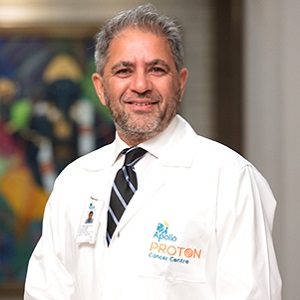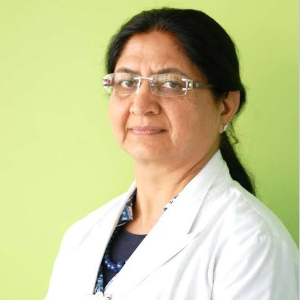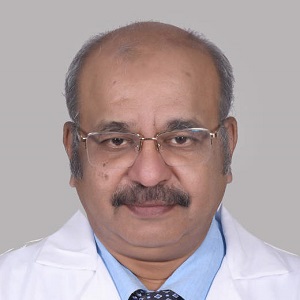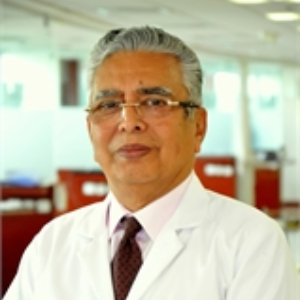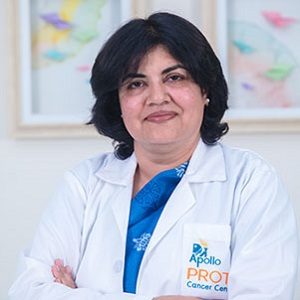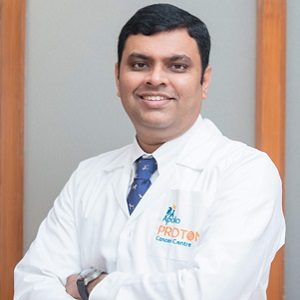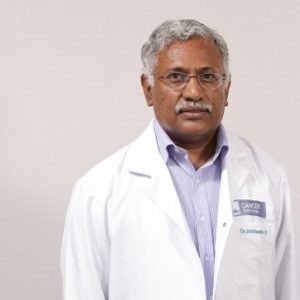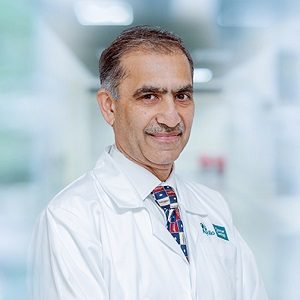Best Brachytherapy Doctors & Hospitals in India
- Neuro Oncologist, Chennai, India
- Over 28 years’ experience
- Apollo Proton Cancer Centre
Profile Highlights:
- Dr. Rakesh Jalali is undoubtedly one of the top Radiation Oncologists in the country who is renowned for his high-precision radiation techniques.
- He provides a wide range of radiation treatments customized to treat different kinds of cancers.
- Dr. Jalali, who has a remarkable 28-year of experience in the field of Neuro-Oncology, is highly proficient in employing sophisticated radiation treatment procedures, such as Electron Beam Radiation treatment (3DCRT), IMRT, IGRT, VMAT, BRT, SABR, DIBH, Brachy Treatment, TBI, and TSET, as well as 4D Gated Radio Treatment. These treatments are carefully employed to treat various kinds of cancers such as brain tumors, breast cancer, lung cancer, prostate cancers, and many more.
- Radiation Oncologist, Gurugram, India
- Over 32 years’ experience
- Medanta-The Medicity, Gurgaon
Profile Highlights:
- Dr. Tejinder Kataria is a globally renowned Radiation Oncologist whose pioneering contributions have significantly advanced cancer treatment in India.
- With over 35 years of experience, she has been instrumental in introducing cutting-edge technologies and establishing prominent oncology departments across prestigious institutions. She is currently the Chairperson of Radiation Oncology at Medanta – The Medicity in Gurugram, New Delhi.
- Dr. Kataria played a pivotal role in founding the Department of Radiation Oncology at Rajiv Gandhi Cancer Institute, New Delhi, and Artemis Health Institute, Gurugram. She also established the Division of Radiation Oncology at Medanta, Gurugram, where she continues to innovate and lead.
- Her interests lie in Stereotactic Radio Treatment (SBRT), Image-Guided Radio Treatment (IGRT), Intensity Modulated Radio Treatment (IMRT), 3-D Conformal Radiation (3D CRT), PET-CT, MRI, SPECT, DSA and CT-Simulator fusion for treatment planning.
- Top Radiation Oncologist | Apollo Hospital, New Delhi, India
- 20+ Years Experience
- Indraprastha Apollo Hospital, New Delhi
Profile Highlights:
- Dr. G K Jadhav is one of the leading radiation oncologists in India.
- He has a complex understanding of cancer biology, clinical care, and radiation physics.
- Dr. Jadhav has an experience of more than 20 years in the field of radiation oncology.
- Radiation Oncologist, Gurugram, India
- Over 40 years’ experience
- Artemis Hospital, Gurgaon
Profile Highlights:
- Dr. Subodh Chandra Pande is a well-known radiation oncologist in India. He has a long and rich clinical and teaching experience in the specialty of radiation oncology.
- He included a Dual Energy Linear Accelerator with Multi-Leaf Collimator at Bhagwan Mahaveer Cancer Hospital and Research Centre (BMCHRC), Jaipur & which was a first for the State of Rajasthan.
- Radiation Oncologist, Chennai, India
- Over 33 years’ experience
- Apollo Proton Cancer Centre
Profile Highlights:
- Dr. Sapna Nangia is a highly proficient clinical and radiation oncologist with versatile experience in cancer management.
- She has an experience of more than 33 years as a doctor across various eminent institutions in the country.
- Radiation Oncologist, Chennai, India
- Over 15 years’ experience
- Apollo Proton Cancer Centre
Profile Highlights:
- Dr. Srinivas Chilukuri has been in one of the top layers of Oncologists in India. He is a renowned Radiation Oncologist with extensive experience. He is also a major thought leader in the field, particularly with regard to high precision radiation treatment, which includes Particle Beam Radiation.
- Radiation Oncologist, Chennai, India
- Over 25 years’ experience
- Apollo Cancer Centre
Profile Highlights:
- Dr. Mahadev P is a radiation oncologist with 25+ years of experience and has played a major role in starting the Diplomate of National Board course in Radio Treatment in 2005.
- After getting trained in Australia, Dr. Mahadev P started Prostate Brachy Treatment at Apollo Specialty Cancer Hospital.
- Dr. Mahadev is also trained in Cyberknife radiosurgery – the only system in the world to treat tumors in the body with sub-millimeter accuracy.
- Radiation Oncologist, Chennai, India
- Over 24 years’ experience
- Apollo Cancer Centre
Profile Highlights:
- Dr. Rathna Devi is a senior Radiation Oncologist who has an experience of 24 years in the field.
- She completed MBBS from M.S. Ramaiah Medical College, Bangalore University, and a Diploma in Radio Treatment from Madras Medical College, Dr. MGR Medical University.
- Dr. Rathna Devi’s areas of expertise include Cranial Cyberknife Radiosurgery, Intensity Modulated Radio Treatment (IMRT), and Stereotactic Body Radio Treatment (SBRT).
- Radiation Oncologist, Chennai, India
- Over 10 years’ experience
- Apollo Proton Cancer Centre
Profile Highlights:
- Dr. Ashwathy Susan Mathew has been an eminent doctor hailing from the Department of Radiation Oncology Apollo Proton Cancer Centre, Chennai.
- She has performed extensive research in the diagnosis and treatment of Gastro-Intestinal Cancers and related metastasis.
- She has been awarded the Parvati Devi Gold Medal for Best Paper at the 34th Annual Conference of the Association of Radiation Oncologists of India.
- Radiation Oncologist, Chennai, India
- Over 30 years’ experience
- Apollo Cancer Centre Chennai
Profile Highlights:
- Dr. Sanjay Chandrasekar is one of the top Radiation Oncologists in Chennai who has an extensive experience of more than 30 years in the field.
- He is currently serving as a Senior Consultant of Radiation Oncology at Apollo Cancer Centre in Chennai.
- His 30+ years-long journey in the field of oncology has brought him a lot of appreciation and recognition in his medical career.
- He has a great deal of expertise treating a range of cancer ailments such as brain tumors—both benign and malignant, head and neck cancers, lung cancer, and uro-gynecological cancers.
- Over the years he has also published numerous papers in peer-reviewed journals on both national and international level. In addition, he has received several honors and commendations for his efforts.
Best Brachytherapy Hospitals India
- City: Kerala, India
Hospital Highlights:
- Established in 2019, Apollo Adlux Hospital is the first Apollo Hospital in Kerala and the 73rd hospital owned by Apollo Group in India. With the state’s most advanced, comprehensive healthcare infrastructure and cutting-edge technologies, Apollo Adlux Hospital stands as an example of medical excellence in Kerala.
- With over 34 multi-specialty departments, the hospital believes in providing the best quality treatment to its patients at affordable rates, ensuring comfort at their difficult times.
- The 300-bed hospital is managed by a team of highly qualified and experienced experts who delivers exceptional hospitality to their patients and treats them with great compassion.
- With its affiliation with the Apollo Hospitals Group, the hospital aims in providing patients with top-notch healthcare services while also serving communities in Kerala.
- The hospital has good railway and road connections, and is conveniently close to Cochin International Airport.
- City: Chennai, India
Hospital Highlights:
- Apollo Cancer Centre in Teynampet, Chennai is one of the best super speciality hospitals in India. It is the country’s first ISO-certified healthcare facility.
- Additionally, it is the first hospital in Chennai and the first oncology hospital in India to receive NABH accreditation.
- The hospital provides advanced tertiary care in oncology, orthopedics, neurology and neurosurgery, head and neck surgery, and reconstructive and plastic surgery.
- Additionally, it offers specialized healthcare of international standards with results comparable to those of the best hospitals in the world.
- It is outfitted with 300 beds, the newest and greatest technology, a large pool of highly qualified specialists, and a committed team of medical and paramedical professionals.
- It is one of the first few medical facilities in India to offer comprehensive cancer care. A team of skilled medical, surgical, and radiation oncologists makes up the Tumour Board, which is a component of the complete treatment planning system. After reviewing reported cases, the Board determines in concert with diagnostic specialists what course of action is best for each individual patient. The panel is further supported by dieticians, medical counselors, speech therapists, and other pertinent specialists.
- The hospital launched the first ExcelsiusGPS® Spine Robot in South India and has completed over 50 surgeries till date.
- It is also one of the few cancer hospitals in India to offer Cyber Knife therapy. Till now it has completed 1320 Cyber Knife therapies.
- The institution is also one of the few in India with the capacity to do transplants and find a prospective unrelated donor. The hospital has performed over 1000 BMTs till now.
- Furthermore, it has an exceptional milestone of performing exultant Micro vascular free tissue transfer and Aesthetic surgeries on more than 1000 patients with success.
- City: Chennai, India
Hospital Highlights:
- Apollo Hospitals, Chennai, is one of the best hospitals for heart care in India. Over the years, Apollo has expanded all over India, as a healthcare chain.
- India’s first ‘Only Pancreas’ transplant was performed in Apollo Hospital. The hospital is known for successfully performing Asia’s first en-bloc combined heart and liver transplant, and over the years, it has attained a remarkable achievement in the global healthcare space. Around 3-4 organ transplants are performed in the hospital per day.
- Equipped with over 500 beds, this hospital in Chennai was established in 1983 and since then has been among the most preferred hospital for patients from all over the world.
- The hospital holds accreditation of the NABH and JCI and is the first hospital in India to be ISO 9001 and ISO 14001 certified. It is also the first South Indian Hospital to receive subsequent reaccreditation from the JCI USA 4 times.
- City: Hyderabad, India
Hospital Highlights:
- Located in the vibrant city of Hyderabad, Apollo Health City is a world-renowned medical facility that provides outstanding care and treatment to patients coming from different parts of the world.
- Founded in 1988, this 550-bed multispecialty hospital with 50 specialties and 12 Centres of Excellence continues to deliver outstanding outcomes for patients with the simplest to the most complicated medical conditions.
- Backed by the latest medical equipment and a dedicated team of professionals, the hospital provides comprehensive treatment across various specialties including, cardiology, critical care, neurosciences, cancer, orthopedics, gynecology, ENT, transplants, gastroenterology, etc.
- Apollo Health City is a cutting-edge healthcare facility that combines various facilities under one roof. These may include state-of-the-art physical medicine, rehabilitation, and wellness services with education, research, telemedicine, innovative medical devices, disease management programmes, and medical talents.
- The hospital is known for offering top-notch cancer treatment accompanied by cutting-edge facilities and technology.
- The hospital also offers a broad spectrum of cosmetic procedures that improve not just appearance but also comfort.
- In 2011, Apollo Health City was the recipient of the Asian Hospital Management Award (AHMA).
- In 2013, the Government of India recognized Apollo Health City as the top medical tourism destination in the country.
Hospital Highlights:
- Apollo Hospitals is a private healthcare group in India, with its headquarters based in Chennai. Established in 1983 by Dr. Prathap C. Reddy, the group offers a wide range of medical treatments and services across various specialties.
- It is renowned for emphasizing innovation and utilizing cutting-edge medical technologies into patient treatment.
- Known as India’s first corporate hospital, Apollo Hospitals is often credited for pioneering the private healthcare revolution in the country.
- With clinics and hospitals located all throughout India, Apollo Hospitals is a nationwide healthcare organization. Its presence can also be found in foreign countries.
- Preventive health examinations, medical and surgical treatment, and diagnostic centres are just a few of the services that the Apollo group provides.
- The group has several centres of expertise, including Cardiac Sciences, Neurosciences, Orthopedics, Emergency Care, Cancer Care, and Organ Transplantation.
- City: Ahmedabad
Hospital Highlights:
- As a member of the Apollo Hospitals Group, Apollo Hospitals International Limited, Ahmedabad is one of the most popular and sought-after medical facilities in Gujarat.
- Through its 6 Centres of Excellence and various affiliated branches, which cover all specialties and subspecialties, the hospital provides the most advanced clinical services.
- Since its inception in 2003, the hospital has been providing each patient with the most up-to-date medical equipment and state-of-the-art technology.
- With more than 150 successful organ transplants, including liver and renal transplants, the facility has been able to build a strong and extensive organ transplant program.
- In addition to performing 600 surgeries and caring for over 1800 patients on an IP basis, the hospital sees more than 18,000 patients on average in the outpatient department.
- With one of the biggest cardiology teams in the area, the hospital provides state-of-the-art regional care treatment in Cardiac Sciences.
- Additionally, the hospital offers a broad range of Neuro Interventional techniques to help stroke patients recover more quickly.
- City: Bengaluru, India
Hospital Highlights:
- Established in 2007, the Apollo Hospitals Bangalore is a 300-bed multispecialty hospital situated in Bannerghatta Road, Bangalore.
- Equipped with the state-of-the-art technology, it is a leading hospital dedicated to providing healthcare needs to patients with compassion and expertise.
- It is the first hospital to have completed the highest number of Robot Assisted Heart Surgeries in India.
- Over the years, it has successfully conducted some of the rarest medical procedures such as spinal angiolipoma excision, autologous chondrocyte implantations, and tibial tuberosity shift with MPSL reconstruction.
- The Apollo Hospitals Bangalore has the reputation of performing the greatest series of airway stents in the country.
- Additionally, the hospital is known for providing comprehensive treatment in specialties such as gastroenterology, urology, gynecology, oncology, colorectal surgery, etc.
- The “The Minimal Access Surgery Centre” (MASC), one of Apollo Hospitals, Bangalore’s premier Centres of Excellence, is devoted to the use of minimally invasive surgical procedures.
- In 2013, THE WEEK-A C Nielsen, Best Hospital Survey ranked Apollo Hospitals Bangalore as the 2nd best multi-speciality hospital in Bangalore.
- City: Mumbai, India
Hospital Highlights:
- Established in 2016, Apollo Hospitals, Navi Mumbai is one of Maharashtra’s most advanced multispecialty hospital. This 500-bed hospital provides sophisticated treatments and integrated super specialty services under one roof.
- The hospital features a cutting-edge infrastructure that houses 13 state-of-the-art operating rooms, advanced laboratory and medical diagnostics, and 120 ultra-modern I.C.U. beds, including N.I.C.U. and P.I.C.U., monitored round the clock by critical care specialists.
- With 57 specialties and subspecialties, the hospital boasts a team of renowned medical specialists who offer accurate diagnosis and treatment with easy accessibility to their patients.
- Additionally, the hospital offers highly customized, individualized health check programs that are made to fit each person’s needs in terms of lifestyle.
- Apollo Hospitals, Navi Mumbai has been accredited by both the National Accreditation Board for Hospitals and Healthcare Providers (NABH) and the Joint Commission International (JCI).
- Apollo Hospitals Navi Mumbai has been awarded the “Best Practices-International Services Award” at the annual awards for service excellence and operations excellence.
- City: Kolkata, India
Hospital Highlights:
- Established in 2003, Apollo Gleneagles Hospitals is a 750-bed multispecialty tertiary care hospital situated in Kolkata.
- With 33 Centres of Excellence and more than 50 specialties, Apollo Gleneagles Hospitals, Kolkata is capable of handling all sorts of patients.
- This tertiary care hospital, which is a 100% subsidiary of Apollo Hospitals Enterprise Ltd., India, is regarded as one of Kolkata’s top hospitals.
- The facility is a complete blend of cutting-edge technology, state-of-the-art infrastructure, and genuine hospitality.
- Focusing on numerous specialties, the hospital provides all-inclusive medical treatments supported by cutting-edge technology and a staff of highly qualified medical specialists.
- Patients across the globe come to Apollo Gleneagles Hospitals Kolkata for their treatment. Moreover, international patients receive full attention and assistance for their treatment and are provided with a hassle free experience.
- Apollo Gleneagles Hospitals, Kolkata is the only hospital in Eastern India to hold the Joint Commission International (JCI) certificate.
- It is also the only hospital in Kolkata to hold the NABL accreditation in six different categories, which includes Clinical Biochemistry, Clinical Pathology, Hematology & Immunohematology, Microbiology & Serology, and Histopathology & Cytopathology.
- Furthermore, Apollo Gleneagles Hospitals, Kolkata is known for performing the first ever Reverse Shoulder Prosthesis Replacement in East India.
- City: Chennai, India
Hospital Highlights:
- The Apollo Proton Cancer Centre in Chennai is the most sought-after private cancer hospital in India. It is an integrated facility that provides cutting-edge, all inclusive cancer treatment to patients all over the globe.
- The hospital is a part of the renowned Apollo Group which has a large network of over 74 hospitals in India and across the globe. Out of the 74 hospitals, 21 of them are cancer centres. However, Apollo Proton Cancer Centre is the only cancer hospital to have JCI accreditation.
- The Centre, which was established on the principles of excellence and expertise, unites a formidable medical staff led by some of the most illustrious figures in cancer treatment.
- The hospital follows the global ASTRO Model Policy. It is the same global policy which is followed by countries like USA, UK, and Europe.
- Apollo Proton Cancer Centre is among the very few hospitals in India to receive patients from First World countries such as USA, Canada, New Zealand, Australia, Singapore, Thailand, etc.
- Apart from that, it is also the first hospital in Chennai to receive patients from several countries like Uzbekistan, Kazakhstan, Turkmenistan, Georgia, Armenia, Azerbaijan, SAARC countries (Bangladesh, Nepal, Sri Lanka, Maldives, Bhutan, Afghanistan, and Pakistan), South Africa, Turkey, Egypt, etc.
- In fact, there is a dedicated team at the Apollo Proton Cancer Centre that serves only international patients. Thus, on a monthly basis, the Centre receives patients from across 32 countries.
- Moreover, there are certain treatments in Apollo Proton Cancer Centre that are not available in any other centre. APCC addresses all types of possible cancers that are usually not covered by any other centre.
Brachytherapy
Gone are the days when Cancer Treatment only meant chemo or external radiation therapy. Thanks to the medical science advancement, cancer treatment methods have undergone some recent changes with new, more focused treatment methods cropping up on the scene! Brachytherapy is one such treatment method that focuses on cancer tumors by placing small radioactive implants as close to the tumor location as possible.
One of the primary reasons why Brachytherapy is recommended, because this therapy focuses on high doses over a small space with the radiation concentrating on the tumor and not on the surrounding tissues or cells. This prevents damage or harm to the surrounding areas of the tumor.
Now you must be wondering how Brachytherapy works with such precision and we’ll get to that, but before we do, let’s breakdown the basics of this treatment style starting with the question-
What is Brachytherapy?
In its simple form, Brachytherapy can be defined as a type of internal radiation in which an implant, which can be anything from wires or seeds to capsules, with a radiation source in it is directly placed inside the body, closer to the tumor. Also known as Internal Radiation Therapy, this form of therapy can effectively shrink the tumor size if not downright eliminate it from your system and can be used to treat cancer types such as-
- Lungs
- Breast
- Prostate
- Head & neck
- Eye
- Uterus, etc.
What are the Different Brachytherapy types?
Primarily, there are two types of Brachytherapy:
Low Dose Rate (LDR) Brachytherapy
- Low Dose Brachytherapy also known as permanent brachytherapy, is a continuous treatment process where a radioactive implant is permanently inserted (either manually or through a machine) in your body and a low dose of radiation seeps out of it continuously for weeks, maybe months, depending on the intensity or growth rate of the tumor. The radioactive implant will release a particular dose of radiation and would focus on gradually shrinking or weakening the tumor.
- In this procedure, you may be asked to detain yourself in the hospital due to the presence of radiation within your body. Even though it’s not harmful, you’ll be kept in a private room with limited visitor access (no children or pregnant women).
- The insertion of the brachytherapy device will not be painful since in most cases anesthesia is used to reduce discomfort. In fact, the presence of the radioactive implant in your body shouldn’t cause any pain or discomfort and if it does, notify your medical team immediately.
High Dose Rate (HDR) Brachytherapy
- High Dose Brachytherapy also known as temporary brachytherapy, is more of a session-wise treatment procedure where radioactive implants are temporarily placed within the body and the therapy continues for a few minutes, up to half an hour itself. Post this, the temporary radiation tube is removed and you can return back to your normal lifestyle without any hassle.
- Since HDR Brachytherapy session is brief, these are recommended for outpatients only which means you don’t have to stay back in the hospital or in isolation. Your medical team may recommend up to 2 sessions of a few minutes each in a day and once the tube is removed, you are free to go. You will also not be radioactive which means you can meet people after your session.
- During the HDR procedure, the radioactive material will be inserted using a computerized machine. Your medical team will leave you alone in the room to avoid unwanted exposure but they will closely monitor you from a nearby room. You can notify them if you feel discomfort or pain, but in most cases, the patients don’t. Once the procedure is done, your medical team will come back in, remove the radiation device and you’ll be free to move about.
Who will your medical team consist of?
Much like any other cancer cure team, there will be some core professionals consisting of radiation oncologists, radiation therapists, dosimetrist to measure your dose, a general physicist on standby (for health ailments occurring during the procedure). There will also be a support team of anesthesiologists, surgeons (to insert or extract implants) and nurses for general care during and after the procedure.
How do you prepare for your brachytherapy?
Once diagnosed and determined, your medical team will decide if Brachytherapy is a suitable option for your condition. Once determined, you will be asked to share a detailed report of your medical history including ongoing medications, health supplements, etc. Consult with your healthcare team for dietary regulations and if any is necessary or not! Your doctor may prescribe certain clinical tests to understand your condition better which can be in the form of :
- EKG
- MRI/ CT scan / Ultrasound
- Certain blood tests
- Chest X-Ray or other imaging tests
- Bowel preparation
What to expect during the Brachytherapy procedure?
Now let us give you a step by step breakdown of what you might expect during this procedure!
Pre-procedure
You’ll have a brief meeting with your medical team before the Brachytherapy procedure during which your doctor/nurse will go over some preliminary exams which may include imaging tests, physical exams, discussing the procedure including side-effects and so on. During this period, patients are requested to share an in-depth report of their medical histories which should also include ongoing medication, intake of health supplements or blood thinners such as aspirin and more. You can even discuss post-procedure care along with dietary regulations or preventative measures.
During the procedure
So by now, you’re aware that Brachytherapy requires focused radiation to eliminate cancer cells, but are you aware of where the implants are placed? Even though the aim is to place the implants as close to the tumor as possible, there are a lot of variables that need to be taken into account. For instance, there are 3 primary locations that are frequently used and they can be:
- Intracavitary Treatment- In this method, the implant is inserted inside cavities within the body, such as uterus or breasts
- Interstitial Treatment- In this method, the implant is inserted right inside the tumor mass.
- Internal Radiation Therapy- In this method, the radiation is inserted in the form of a medicine, preferably through a vein or into a body cavity.
Depending on the procedure type you may have to stay back in the hospital for a few nights or be in an isolated room while your temporary radiation procedure takes place. You can refer to our Different Brachytherapy Types segment to know more about this.
Post-procedure radiation management & brachytherapy
There is always a chance that the radiation source in your body may make you radioactive for a brief span of time which is why patients are often requested to stay indoors, preferably isolated for a while. This is more common in high-dose brachytherapy where the radiation source is implanted inside the body.
This also means visitors with chronic illnesses, children and pregnant women should avoid coming in contact with you. In fact, visitor meet and greet should be kept zero or at the minimum to avoid unnecessary exposure.
FAQs
1. What are some of the Brachytherapy side effects I should be aware of?
Both LDR and HDR may come with certain side-effects. The most immediate ones that occur right after the procedure can be urinary problems including blood in the urine or frequent need to pass urine. Some later symptoms may include constipation.
2. How long will the implant stay in my body?
This solely depends on your cancer cure rate. Depending on the severity of the condition or your body’s reaction to this procedure, the implants may stay for weeks and even months. However, once the radiation oozes out of the implants, they won’t stay active anymore.
3. How would doctors know if the procedure is working or not?
4. Will I feel pain and discomfort during this procedure?
Even though the implant plantation itself can be a little painful (which is why doctors use anesthesia for this part), once the implant is inside, you shouldn’t feel any pain or discomfort.

